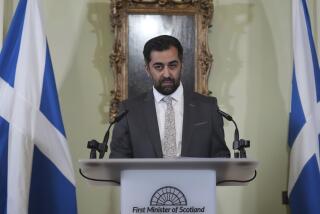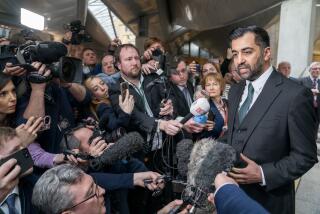Scotland opts to stay with Britain
- Share via
Reporting from Edinburgh, Scotland — Voters in Scotland have rejected independence from Britain, opting to preserve a more than 300-year-old union in a referendum Thursday that sent shock waves through Europe and opened the door to continuing political tumult in Britain.
With turnout at 84.6% in a contest so closely watched that many pubs got special license to stay open all night as the returns came in, voters dealt a decisive blow to the controversial ballot measure that would have ended Scotland’s union with England, Wales and Northern Ireland.
The independence measure was losing Friday in all-but-final returns, with 55% against independence and 45% voting “yes.”
The outcome was a blow to First Minister Alex Salmond and his Scottish National Party, which pushed for the referendum when it won a majority in the Scottish regional parliament in 2011.
“Let us not dwell on the distance we have fallen short,” Salmond said in a concession speech early Friday. “A movement is abroad in Scotland that will take this nation forward, and we shall go forward as one nation.”
He thanked the 1.6 million Scots who voted for independence, saying, “This has been a triumph for the democratic process and for participation in politics.”
British Prime Minister David Cameron, who had staked much of his political capital on holding the union together, was visibly relieved at the outcome.
“It would have broken my heart to see our United Kingdom come to an end,” he said Friday in an address outside his office on Downing Street in London. “Now the debate has been settled for a generation. ...There can be no disputes, no reruns. We have heard the settled will of the Scottish people.”
He paid tribute to the pro-independence camp for a well-fought campaign. “Now is the time for our United Kingdom to come together and to move forward,” he said.
Independence has been a long-cherished goal for Scottish nationalists. But though the result was not what they had hoped for, Scotland is still poised to wrest more powers from the central government in London. Hoping to win over disaffected Scots, the three main political parties in Britain promised last month to turn over more control over tax policy and public spending to the semiautonomous government in Edinburgh.
“Scotland will expect these [promises] to be honored in rapid force,” Salmond said.
Cameron pledged to make good on those promises, but also said that voters in the rest of Britain would be given a similar opportunity for increased self-determination.
“Just as the people of Scotland will have more power over their affairs, so it follows that the people of England, Wales and Northern Ireland will have a bigger say over theirs,” he said. “We now have a chance, a great opportunity, to change the way the British people are governed and change it for the better.”
Thursday’s referendum sparked intense interest, and the turnout was the highest Scotland has ever recorded. It included 16- and 17-year-olds, who were allowed to vote for the first time.
Opinion polls showed a close race leading up to the balloting. Scotland’s pro-independence camp closed a gap of more than 20 percentage points in the campaign’s final months.
But Scotland’s pro-union “Better Together” campaign focused voters’ attention on the risks of independence. Much of the debate centered on economic concerns, such as how long Scotland could depend on tax revenue from dwindling oil and gas reserves in the North Sea and questions over what currency an independent Scotland would use.
Nationalists said they wanted to keep the British pound, but the government in London consistently ruled out a currency union if voters chose to break from the United Kingdom of Great Britain and Northern Ireland.
John Curtice, a political scientist at Scotland’s University of Strathclyde, said the “no” vote means the rest of Britain can breathe a sigh of relief.
“Awkward issues, such as what do we do with our nuclear weapons facility, don’t have to be faced,” Curtice said. “The potential damage to the U.K.’s prestige ... is removed.”
Britain has a fleet of nuclear-armed submarines based 25 miles downriver from Glasgow. Salmond and his party had vowed to make Scotland free of nuclear weapons within four years of independence, and the British government could have been faced with the costly task of relocating its Trident sub naval base.
Some former British military chiefs had argued that even a temporary loss of Britain’s nuclear weapons capability would have been destabilizing, possibly undermining the country’s position in the North Atlantic Treaty Organization and on the United Nations Security Council.
For Jeremy Thornton, the decision on how to vote was a difficult one.
“Up until recently I was a firm ‘no’ voter,” he said Thursday outside his polling place in central Edinburgh. He said he initially believed that independence was too risky a proposition. But the benefits started to look appealing, he said, noting that Scotland’s government would be more directly elected.
“I think you should be able to vote for the government that rules you,” Thornton said.
Anna Wright said she voted no, fearing the economic risks of independence were too great. “I was wavering a little bit, because I think [it’s good to] ... be able to govern yourself a bit more,” she said. “But at the same time, I think Alex Salmond didn’t really have the plans in place.”
The referendum also attracted supporters of other separatist movements near and far. Aran Jones drove to Edinburgh from Wales to volunteer for the “yes” campaign. Marie-Jose Laforest came from Quebec, Canada. And Montse Berdura arrived from a small town near the Spanish city of Barcelona. “If Scotland gets independence, it will be easier for Catalan people to be independent,” Berdura said, referring to the separatist movement in northeastern Spain’s Catalonia region.
Former British Prime Minister Gordon Brown, a native of Scotland who remains a member of the British Parliament, has laid out a swift timetable for more devolution of authority to Scotland. However, Britain’s main political parties have yet to agree on what exactly that will entail.
Vernon Bogdanor, a British constitutional expert at King’s College London, says granting greater autonomy to Scotland will spark debate over whether England should also have its own parliament, as do Wales and Northern Ireland.
“It’s awakening English nationalism, which has been hitherto almost nonexistent,” Bogdanor said. “English [members of Parliament], pressed by their constituents, have already said, ‘Well, what about England?’ And there’s some pressure for devolution in England.”
Though Britain’s opposition Labor Party welcomes Scotland’s “no” vote, Michael Keating, a political scientist at the University of Aberdeen in Scotland said the referendum should be a “wake-up call” to the party. Labor holds 41 of Scotland’s 59 seats in the British Parliament. “They’re going to have to rethink their position in Scotland and how to get a distinctive Scottish profile,” he said.
Independent or not, Scotland has been transformed by the referendum, Keating said.
“Everybody in this society has gained because we had this serious debate, which hasn’t been divisive, and it involved rather intelligent discussions about very complicated issues,” he said.
“There’s been an extraordinary politicization of the society, so the politics between Scotland and the U.K. will never be the same again.”
Werth is a special correspondent.
More to Read
Sign up for Essential California
The most important California stories and recommendations in your inbox every morning.
You may occasionally receive promotional content from the Los Angeles Times.










